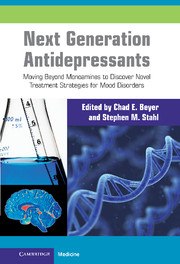 Next Generation Antidepressants
Next Generation Antidepressants Published online by Cambridge University Press: 19 October 2021
Family studies indicate that major depressive disorder runs in families, although family members’ risk for other psychiatric disorders may also be increased. Twin and adoption studies suggest that about one-third of the liability for MDD is inherited. Studies investigating individual candidate genes have failed to implicate any single gene in MDD risk. Emerging evidence from genome-wide association studies may identify novel risk genes, although any individual genetic variation appears likely to have only modest effect. Whether focusing on clinical subtypes of MDD, or relying on imaging or other biomarkers rather than clinical features, will expedite the process of gene discovery remains to be determined.
To save this book to your Kindle, first ensure [email protected] is added to your Approved Personal Document E-mail List under your Personal Document Settings on the Manage Your Content and Devices page of your Amazon account. Then enter the ‘name’ part of your Kindle email address below. Find out more about saving to your Kindle.
Note you can select to save to either the @free.kindle.com or @kindle.com variations. ‘@free.kindle.com’ emails are free but can only be saved to your device when it is connected to wi-fi. ‘@kindle.com’ emails can be delivered even when you are not connected to wi-fi, but note that service fees apply.
Find out more about the Kindle Personal Document Service.
To save content items to your account, please confirm that you agree to abide by our usage policies. If this is the first time you use this feature, you will be asked to authorise Cambridge Core to connect with your account. Find out more about saving content to Dropbox.
To save content items to your account, please confirm that you agree to abide by our usage policies. If this is the first time you use this feature, you will be asked to authorise Cambridge Core to connect with your account. Find out more about saving content to Google Drive.